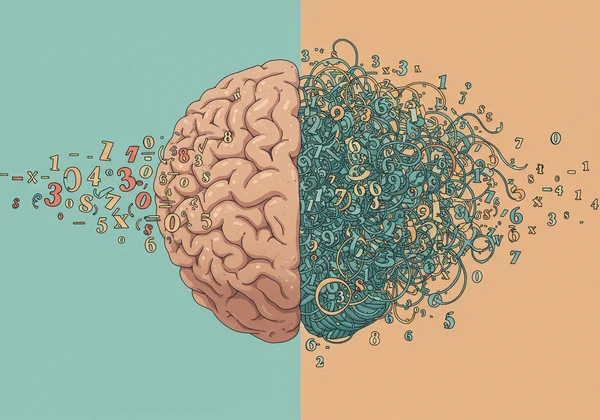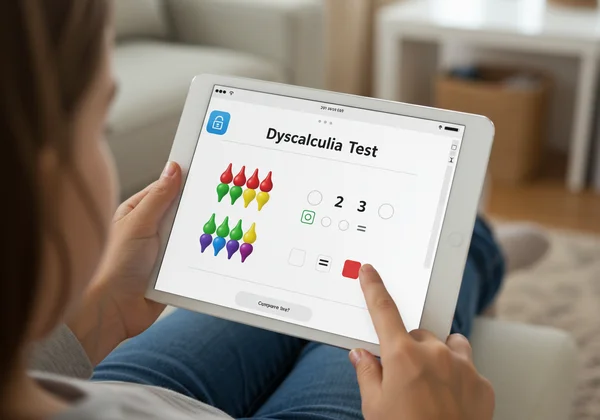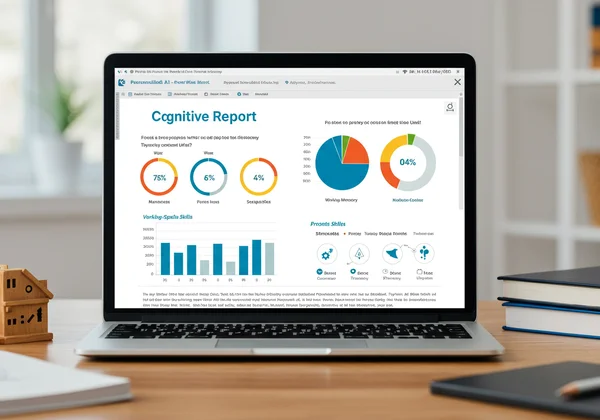A Parent's Guide to Supporting a Child with Dyscalculia
August 17, 2025 | By Aisha Bennett
Watching your bright, creative child struggle with numbers can be confusing and heartbreaking. You see their frustration mounting over math homework and their confidence shrink in the classroom. It's natural to wonder if it's just a lack of effort or something more profound. You are not alone in this, and there are clear, supportive answers. Providing effective support for a child with dyscalculia begins with understanding, and this guide is your first step. So, is it dyscalculia or is my child just bad at math? Let's explore this together and find a path forward. The journey to clarity can begin today with a free dyscalculia screening.
What is Dyscalculia? A Guide for Parents
Before we can offer support, we need to understand what we're facing. This parent guide to dyscalculia aims to demystify this common learning difference. Dyscalculia is a specific and persistent difficulty in understanding numbers, which can affect a person's ability to learn number-related concepts, perform accurate or fluent calculations, and reason mathematically. Crucially, it is not a reflection of a child's intelligence or their willingness to learn. It's a neurological difference in how the brain processes numerical information.
Think of it like dyslexia, but for numbers. Just as a child with dyslexia might struggle to connect letters to sounds, a child with dyscalculia struggles to connect a number symbol (like "5") to the quantity it represents (five objects). This fundamental challenge can create a ripple effect, making everything from basic addition to complex algebra feel like an insurmountable obstacle. Understanding this is the foundation of providing compassionate and effective support.

What Are the Early Signs of Dyscalculia in Children?
Identifying the issue is the first step toward a solution. While symptoms vary by age, there are common red flags. The signs of dyscalculia in children often appear early.
- In Preschool: Difficulty learning to count, trouble recognizing number symbols, and an inability to connect a number to a group of items (e.g., knowing that "3" applies to three toys).
- In Elementary School: Continued use of fingers to count beyond early grades, trouble recalling basic math facts like 2+3=5, difficulty with place value, and anxiety about math-related tasks. They might struggle with estimating, like guessing which of two lines is longer.
- In Middle and High School: Difficulty understanding graphs and charts, trouble with multi-step problems, challenges with measuring ingredients for a recipe, and struggles with money management or telling time on an analog clock.
If these signs feel familiar, it doesn't automatically mean your child has dyscalculia, but it does indicate that their math struggles warrant a closer look.
Dyscalculia vs. Math Anxiety: What’s the Difference?
It's common for children with dyscalculia to develop math anxiety, but the two are not the same. Math anxiety is an emotional reaction—fear, tension, and apprehension—related to math. Dyscalculia is a cognitive learning difference that causes the struggle. Often, the persistent difficulty and failure resulting from dyscalculia lead to intense anxiety.
A key difference is the source of the problem. A child with only math anxiety might understand the concepts when calm but freeze during a test. A child with dyscalculia struggles with the concepts themselves, whether they are anxious or not. Addressing the underlying cognitive challenges with the right strategies can often reduce the anxiety that comes with them. Taking an online dyscalculia test can help you start to distinguish between the two.
Debunking Myths About Dyscalculia and Math Struggles
Our society often perpetuates harmful myths about math struggles. You might have heard people say, "They're just lazy," or "They need to try harder." These statements are not only incorrect but also damaging to a child's self-esteem.
Another common myth is that being "bad at math" is a fixed trait. This isn't true. With the right support and teaching strategies tailored to their unique way of thinking, children with dyscalculia can make significant progress and build confidence. Recognizing their struggle as a legitimate learning difference, not a character flaw, is the most powerful shift a parent can make.
Understanding Dyscalculia Screening & Our Free Test
Once you suspect a learning difference, the next question is, "What do I do now?" This is where a dyscalculia screening becomes an invaluable tool. It’s a crucial step to move from worried observation to informed action. It provides a data-driven starting point to understand your child’s challenges better.
Our website offers a free, accessible, and comprehensive screening tool designed by educational psychologists and math experts. It is built to give parents and educators a preliminary look into the specific mathematical and cognitive challenges a child might be facing. Please remember, this is a screening tool, not a formal medical diagnosis. However, its results can empower you with the knowledge needed to seek the right support.
How Our Online Dyscalculia Test Works
We've made the process simple and stress-free. The online dyscalculia test involves a series of carefully designed multiple-choice questions that assess various aspects of numerical cognition. These questions go beyond simple arithmetic; they probe number sense, spatial reasoning, and other cognitive skills linked to dyscalculia.
Your child can take the test from the comfort of home, in a low-pressure environment. Upon completion, you will receive an immediate summary of the results, indicating a low, medium, or high likelihood of dyscalculia traits. This initial result alone can be incredibly validating and provide a clear direction for your next steps.

Interpreting Screening Results: What Do They Mean?
Receiving the results is an important moment. A "low" result suggests that dyscalculia is unlikely to be the primary cause of your child's math difficulties. A "medium" or "high" result indicates that dyscalculia-related traits are present and that further exploration is highly recommended.
This result is not a label but a guide. It's a piece of the puzzle that helps you understand why your child is struggling. You can use this information to start a more productive conversation with your child’s teachers and, if necessary, seek a formal evaluation from a specialist. The goal is clarity, not a diagnosis from a single test.
Beyond the Score: The Value of an AI-Powered Report
Here is where our tool truly shines. Beyond the basic score, you have the option to unlock a detailed, AI-powered analysis report—completely free. By providing some anonymous background information, you can receive a personalized cognitive profile of your child's learning.
This report doesn't just tell you if there's a problem; it helps you understand the nature of it. It breaks down potential strengths and challenges, explains how these might impact daily life, and—most importantly—provides customized, actionable strategies and learning recommendations. This is the blueprint for how you can start helping right away. Unlock your child's personalized report for these deeper insights.

Helping Your Child with Math: Home & School Strategies
Armed with understanding and insight, you are now in a powerful position. Helping your child with math is a collaborative effort between home and school, focused on building skills and confidence. The goal is to reframe their relationship with math from one of fear to one of curiosity and competence.
Creating a Math-Positive Environment at Home
Your home should be a safe space for mathematical exploration. Focus on improving your child's foundational number sense through everyday activities.
-
Make it Real: Involve your child in cooking (measuring), shopping (calculating costs), or planning a trip (estimating time and distance).
-
Play Games: Board games, card games, and puzzles are fantastic for developing strategic thinking and number fluency without the pressure of worksheets.
-
Praise Effort, Not Just Answers: Celebrate persistence and creative problem-solving. Say, "I love how you kept trying that difficult problem!" instead of "You're so smart!"
-
Use Visuals: Use physical objects like blocks, beads, or even drawn diagrams to make abstract concepts concrete and easier to grasp.
-
Talk Through Your Thinking: When you solve a simple math problem out loud (e.g., "We need six slices of pizza, and there are three of us, so we each get two"), you model that math is a process of thinking, not just getting the right answer.

Collaborating with Teachers for Classroom Accommodations
Open communication with your child's teacher is critical. Share the results of the dyscalculia assessment and the AI report. Work together to implement classroom accommodations that can level the playing field.
Effective accommodations might include:
- Allowing the use of a calculator for complex calculations.
- Providing extra time on tests and assignments.
- Giving access to charts of math facts or formulas.
- Using graph paper to help align numbers in columns.
- Breaking down instructions into small, manageable steps.
Recommended Learning Tools and Fun Math Activities
Technology and hands-on tools can be game-changers. There are many excellent learning tools designed to support students with learning differences. Look for apps and software that use gamification to make practice engaging. Physical manipulatives, like Cuisenaire rods or base-ten blocks, are also incredibly effective for demonstrating concepts visually. The key is to find what clicks with your child's unique learning style.
Empowering Your Child: Your Journey Starts Now
Your journey as a parent of a child with math challenges is one of advocacy, patience, and love. By seeking to understand the root of their struggles, you've already taken the most important step. Dyscalculia is not a barrier to success; it's simply a different path for learning. With the right support system at home and school, your child can and will thrive.
Feeling informed and ready to take the next step? Discover your child's unique learning profile and get a personalized action plan. Take our free, expert-designed dyscalculia screening test today.
Frequently Asked Questions from Concerned Parents
How do you test for dyscalculia at home?
While a formal diagnosis requires a licensed professional, you can start with a high-quality screening tool at home. Our free dyscalculia test is an excellent first step. It's designed by experts to identify key indicators of this learning difference, giving you a strong foundation for conversations with educators and specialists.
What are the early signs of dyscalculia in children?
Early signs often include difficulty learning to count, trouble linking a number to a quantity (e.g., "4" means four items), struggling to recognize number patterns, and relying on finger counting for basic math long after peers have stopped.
Is it dyscalculia or is my child just bad at math?
"Bad at math" is often a label for a wide range of issues, from anxiety to gaps in instruction. Dyscalculia, however, is a specific, brain-based learning difference that makes understanding numbers inherently difficult. A screening can help differentiate between a general struggle and the specific cognitive patterns associated with dyscalculia.
Is there a free test for dyscalculia available online?
Yes, absolutely. We provide a comprehensive and completely free dyscalculia test on our website. It’s a confidential and accessible way to gain valuable insights into your child’s challenges and discover your results immediately.
What's the difference between a screening and a formal diagnosis?
A screening, like our free online test, is a preliminary tool to identify potential signs of dyscalculia. It provides an indication of risk. A formal diagnosis is a comprehensive evaluation conducted by a qualified professional, such as an educational psychologist, which can definitively diagnose the learning difference and is often required for official school accommodations like an IEP or 504 plan.